|
|
|
Sort Order |
|
|
|
Items / Page
|
|
|
|
|
|
|
| Srl | Item |
| 1 |
ID:
179117
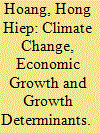

|
|
|
|
|
| Summary/Abstract |
Using the Feasible Generalized Least Squares econometric method, the paper analyzes the impact of climate change on economic growth in Vietnam’s coastal South Central region over the period of 2006–2015. The results indicate that, after controlling for the main determinants in the growth model, the climate change with various proxies has a significantly negative impact on provinces’ economic growth in the region. In particular, local institutions not only increase economic growth, but also reduce the negative impact of climate change on economic growth as well. These results suggest some policy implications aimed at boosting the process of transforming the economic growth model for the coastal region adapting to climate change.
|
|
|
|
|
|
|
|
|
|
|
|
|
|
|
|
| 2 |
ID:
179106


|
|
|
|
|
| Summary/Abstract |
This article develops a critical analysis of the colonial world of the postcolonial historians whose works inadvertently contribute to the process of reconstituting the colonial construction of tribal identities in neoliberal India. The monolithic and colonial construction of tribal identities in postcolonial India reinforces and preserves tribal identities along the lines of the colonial methods of identity formation based on territorialization. The article highlights the problematic features of the territorialization and deterritorialization of tribal identities and their reconstitution. Territorial-based identity formation is now being used and sustained by the neoliberal political and economic ruling and non-ruling elites in order to exploit tribal communities. The existence of upper-caste and class-based Hindu social order is concomitant with a social hierarchy based on the exploitation of tribal communities in India. This article locates the colonial and neoliberal capitalist logic of identity formation that serves elites, and helps to advance the neoliberal political-economic project of the Hindu right. A postmodern logic of identity formation facilitates the expansion of the neoliberal capitalist economy with the process of Hinduization. It contributes to identity formations that divide the people on territorial grounds. The article is divided into four parts. The first outlines the philosophical basis of identity formation and its links with neoliberalism; the second deals with identity formation based on territory; part three documents the debates on tribal identity formation in postcolonial India; and the final part elucidates the capitalist logic inherent in territorial-based identity formations.
|
|
|
|
|
|
|
|
|
|
|
|
|
|
|
|
| 3 |
ID:
179116


|
|
|
|
|
| Summary/Abstract |
Since donning the mantle of authority, President Putin has taken actions which have uninhibitedly been geared at reasserting Russia’s hegemony around the world. Putin’s Look East policy stems from his schematic geopolitics, a plan which was formally announced in 2010. Through the prism of Putin’s Look East policy, the paper contextually analyses Russia–South Asia relations, with reference to India and Pakistan. By cross-examining Russia’s official foreign policy documents, the paper establishes why South Asia is paramount to Russia’s economic and geostrategic reassertion. Every new policy has its challenges, and the same holds true for the Look East policy vis-à-vis South Asia. Premised on the unfolding geopolitics in the region, the paper surmises that striking a balance between New Delhi and Islamabad will be problematic for Moscow, just as it has always been for Washington.
|
|
|
|
|
|
|
|
|
|
|
|
|
|
|
|
| 4 |
ID:
179107
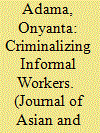

|
|
|
|
|
| Summary/Abstract |
The article examines the criminalization of street vendors in Abuja, Nigeria. It draws on the debate on informality, legality and rights, to highlight the tensions surrounding the law as a mode of regulation. As documented, ideology provides the rationale for the criminalization of street vending. The activity is deemed inimical to the modernist ideals of a clean and functioning city. Enforcement of the law is accompanied by the harassment of vendors. However, vendors remain on the streets by circumventing the law. The article highlights the shortcomings of a simplistic approach to the governance of informality. It cannot be legislated away.
|
|
|
|
|
|
|
|
|
|
|
|
|
|
|
|
| 5 |
ID:
179101


|
|
|
|
|
| Summary/Abstract |
The death penalty has been the subject of controversy for a long time. South Asian countries have found themselves with this controversy by acquiring an ambivalent approach towards the death penalty. Out of eight South Asian countries, Afghanistan, Bangladesh, India and Pakistan retain the death penalty law, and firmly believe that the death penalty can deter people from committing future crimes, whereas Sri Lanka and Maldives have chosen to retain the death penalty law but have abolished it in practice. Conversely, Nepal and Bhutan are the only two countries that have abolished death penalty both in law and practice. In this context, this comparative study of death penalty trials explores the approach taken by the judiciary of two South Asian jurisdictions, Bangladesh and India, towards the death penalty. This paper utilizes the findings of two original empirical research projects that explored judges’ opinions on the retention and administration of the death penalty in both jurisdictions. Amnesty International death penalty reports along with the case judgements are used, which helped to portray the true approach and flaws in the death penalty trials in both the jurisdictions. The paper will assess the death penalty trials and approach of the different stakeholders in the trial to highlight the distinct approaches taken by the two jurisdictions towards the death penalty. The paper argues that in both countries there is inconsistency in sentencing, the social cry for justice is prioritized over convicts’ rights and, from judges to legal representatives, all the stakeholders involved in a criminal trial hold a convictive approach, making a criminal justice system which presumes justice is served by awarding the death penalty.
|
|
|
|
|
|
|
|
|
|
|
|
|
|
|
|
| 6 |
ID:
179112


|
|
|
|
|
| Summary/Abstract |
The adverse effects of climate change on agricultural productivity are on the increase. This study employed both descriptive statistics and the multivariate probit model to estimate factors constraining the adoption of climate change adaptation strategies among smallholder farmers in the study area. The empirical results of the multivariate probit model showed that a lack of knowledge of climate change constraints was influenced by smallholder farmers’ age, gender, off-farm activity, susceptibility and membership in farmer-based organizations. Thus, to improve the adaptive capacity of farmers, government and development partners should work together to improve the conditions under which farmers can gain access to climate change information and suitable agricultural credit as well as policy incentives aimed at lowering the stringent conditions of borrowing in the agricultural sector.
|
|
|
|
|
|
|
|
|
|
|
|
|
|
|
|
| 7 |
ID:
179102
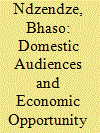

|
|
|
|
|
| Summary/Abstract |
This paper expands upon a hitherto underexplored finding by Rich and Banerjee’s 2015 model which finds that Taiwan has done comparatively better with non-democracies in Africa. The paper proposes that democratisation makes an African state more responsive to domestic economic imperatives and thus more likely to form relations with the demographically and economically larger People’s Republic of China because of the prospective trade, aid and investment gains to be made once such a switch is affected. Seven case studies conducted over the 2001–2018 period yield results which are in line with this hypothesis.
|
|
|
|
|
|
|
|
|
|
|
|
|
|
|
|
| 8 |
ID:
179109
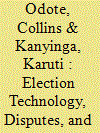

|
|
|
|
|
| Summary/Abstract |
In Africa, many countries have adopted technology in the conduct of elections so as to improve efficiency and deter malpractice. However, electoral disputes and violence continue to recur even where elections involve use of technology. This article builds on a case study of Kenya to show the limitations of technology use in elections. We argue that use of election technology does not guarantee the credibility of elections; technology has become a ‘black box’, which competing parties exploit to either play victim or declare themselves winners. The paper concludes that election technology is the new frontier for fraud. The manner in which election technology is procured, deployed and utilized is not only technical but also political. Addressing this political problem is imperative to avoid political violence around elections.
|
|
|
|
|
|
|
|
|
|
|
|
|
|
|
|
| 9 |
ID:
179111
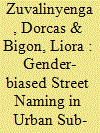

|
|
|
|
|
| Summary/Abstract |
This article explores the present-day problematic of gender-biased street names as prevalent in sub-Saharan Africa’s cityscapes. That is, the abundance of masculine street names as opposed to feminine ones in the urban environments of this region. The article first provides a comparative view on the scope of this toponymic phenomenon in other geographic regions with relation to sub-Saharan Africa. It also identifies few decisive factors in the creation of the gender-biased urban landscapes in sub-Saharan Africa. These factors consist of: recent tendencies in critical toponymy studies; colonial and post-colonial cultures of governmentality; and inadequate urban planning legislation and vision as pertained by post-colonial states. This toponymic problematic is then exemplified in a site-specific analysis of the city of Bindura in north-eastern Zimbabwe. The article concludes with recommendations for designing a more socially inclusive urban management policy in the region, pointing to future research directions of this under-studied phenomenon in critical place-name studies.
|
|
|
|
|
|
|
|
|
|
|
|
|
|
|
|
| 10 |
ID:
179113


|
|
|
|
|
| Summary/Abstract |
Youth unemployment has emerged as a major policy issue in the recent past. Within policy circles two solutions have been proposed: first, investing in youth education, and second, incorporating youth into agriculture. Our thesis, backed by a long history of proletarianisation, is that perceptions of work and agriculture, which have become deeply entrenched in society, tend to undermine any prospects of educated youth engaging in agriculture-based livelihoods. We develop our argument by focusing on the experiences, responses and livelihood pathways of young university graduates in the city of Bulawayo. We show that young graduate youth prefer livelihood activities which maintain their status as educated citizens, and that agriculture does not confer such status. We argue that young graduates’ aspirations and livelihood pathways are often dictated by societal attitudes and views of what is an acceptable occupation. In this regard, our thesis contradicts the widespread faith in agriculture placed by policymakers in Africa.
|
|
|
|
|
|
|
|
|
|
|
|
|
|
|
|
| 11 |
ID:
179114


|
|
|
|
|
| Summary/Abstract |
The South African government intends to improve rural livelihoods through land and agrarian reform. However, in doing so the government is enforcing large-scale production in the land reform projects with little regard for the beneficiaries’ background or capabilities, which are not suited to large-scale production. The article demonstrates how large-scale farming is negatively affecting land beneficiaries’ production by undermining their ability to produce the quality products (and adequate quantities) that satisfy the standards in the increasingly concentrated markets dominated by agribusiness.
|
|
|
|
|
|
|
|
|
|
|
|
|
|
|
|
| 12 |
ID:
179108


|
|
|
|
|
| Summary/Abstract |
The phenomenon of local knowledge of the fishing community about fish ethology and conservation of existing natural resources are investigated in this article. It explores the inextricably intertwined aspects and long-lasting constructive dependence of marine resources with a symbiotic relationship as critical components for integration with marine ecology. Lastly, the paper emphasizes the significance of local knowledge beliefs and systems which promote natural marine conservation methods for increased economic prosperity. The study focuses on the Telugu marine fishing community in South India.
|
|
|
|
|
|
|
|
|
|
|
|
|
|
|
|
| 13 |
ID:
179110
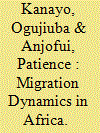

|
|
|
|
|
| Summary/Abstract |
International migration has continued to increase over the years. As people relocate to seek opportunities, their hopes and aspirations for a better life become a driving force. The extent to which their expectations are achieved is not documented in South Africa. This paper examines the expectations versus experiences of international immigrants in South Africa using Cameroonian and Democratic Republic of Congo immigrants residing in Cape Town. A qualitative approach with snowball sampling selected key informants from Cameroonian and Congolese nationalities in Cape Town. Results suggest that most immigrants did not meet their expectations for migrating, due to migration policy limitations of the host country exempting them from opportunities. The results align with both the Capability Approach theory and Lee’s model of migration. Most of the immigrants showed despondency but do not prefer the option of returning to their home country. This is because they have not attained their goals for migration. The paper recommends that policy discussion between the South African government and stakeholders has become imperative to obtain an informed perspective on the dynamics of migration.
|
|
|
|
|
|
|
|
|
|
|
|
|
|
|
|
| 14 |
ID:
179105


|
|
|
|
|
| Summary/Abstract |
In June 2012 the government of Ghana added 42 new districts to the country’s system of local governance. This paper measures the impact of one new district in terms of private wealth accumulation, access to public services and political engagement. Data analysed comes from a panel survey of residents of the new district capital and two similarly sized villages, one in the new district and one just outside. Proponents of government fragmentation promise personal, public and political gains when government is brought closer to the people. Evidence weighed here suggests that these gains are largely realized by residents.
|
|
|
|
|
|
|
|
|
|
|
|
|
|
|
|
| 15 |
ID:
179104
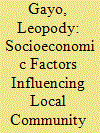

|
|
|
|
|
| Summary/Abstract |
We assessed the factors influencing local community perceptions towards lions in the Selous Game Reserve, Tanzania. Data were collected from 384 households through questionnaire surveys, interviews, and focus group discussions, and analyzed by content analysis and IBM SPSS version 20. About 86% (n=331) of respondents had negative perceptions towards lions. Education (p=0.0016, R=1.68), occupation (p=0.0021, R=−2.07), livestock numbers (p=0.0011, R=0.-0.43), livestock management (p=0.0006, R=0.373), water sources (p=0.0019, R=−0.21), and distance from the protected area (p=0.0183, R=2.11) were significant factors for community perceptions towards lions. We recommend compensation for the victims of lion attacks to reduce negative attitudes towards the species
|
|
|
|
|
|
|
|
|
|
|
|
|
|
|
|
| 16 |
ID:
179103


|
|
|
|
|
| Summary/Abstract |
The study employs in-situ primary data supplemented with secondary information from conventional archival sources to examine the toponymic experience of Ethiopia, one of only two African countries without a colonial history. The focus is on Mekelle, the country’s third largest city. The city’s spatial structure is nondescript. The streets are identified with a string of numbers, which are placed at irregular intervals. Most landmarks are unnamed whereas buildings are unnumbered. This paper shows that the absence of a precise and unambiguous street, place and property identification system in the city stifles its performance in the urban management, economic, and social milieus.
|
|
|
|
|
|
|
|
|
|
|
|
|
|
|
|
| 17 |
ID:
179115


|
|
|
|
|
| Summary/Abstract |
Extant literature has explored the effects of foreign aid on armed conflicts and state repression, but not on public demonstrations. This article compares distribution patterns of Chinese and World Bank-funded projects and public demonstrations in Cameroon, receiving predominantly Chinese official finance, and Uganda, receiving predominantly traditional, Western aid. Distributive patterns suggest negative and positive associations between Chinese and traditional official finance on the one hand and public demonstrations on the other. However, with respect to anti-project demonstrations specifically, I find through fieldwork interviews in Cameroon that Chinese-funded projects are more prone to anti-project demonstrations owing to less stringent risk management standards.
|
|
|
|
|
|
|
|
|
|
|
|
|
|
|
|
|
|
|
|
|